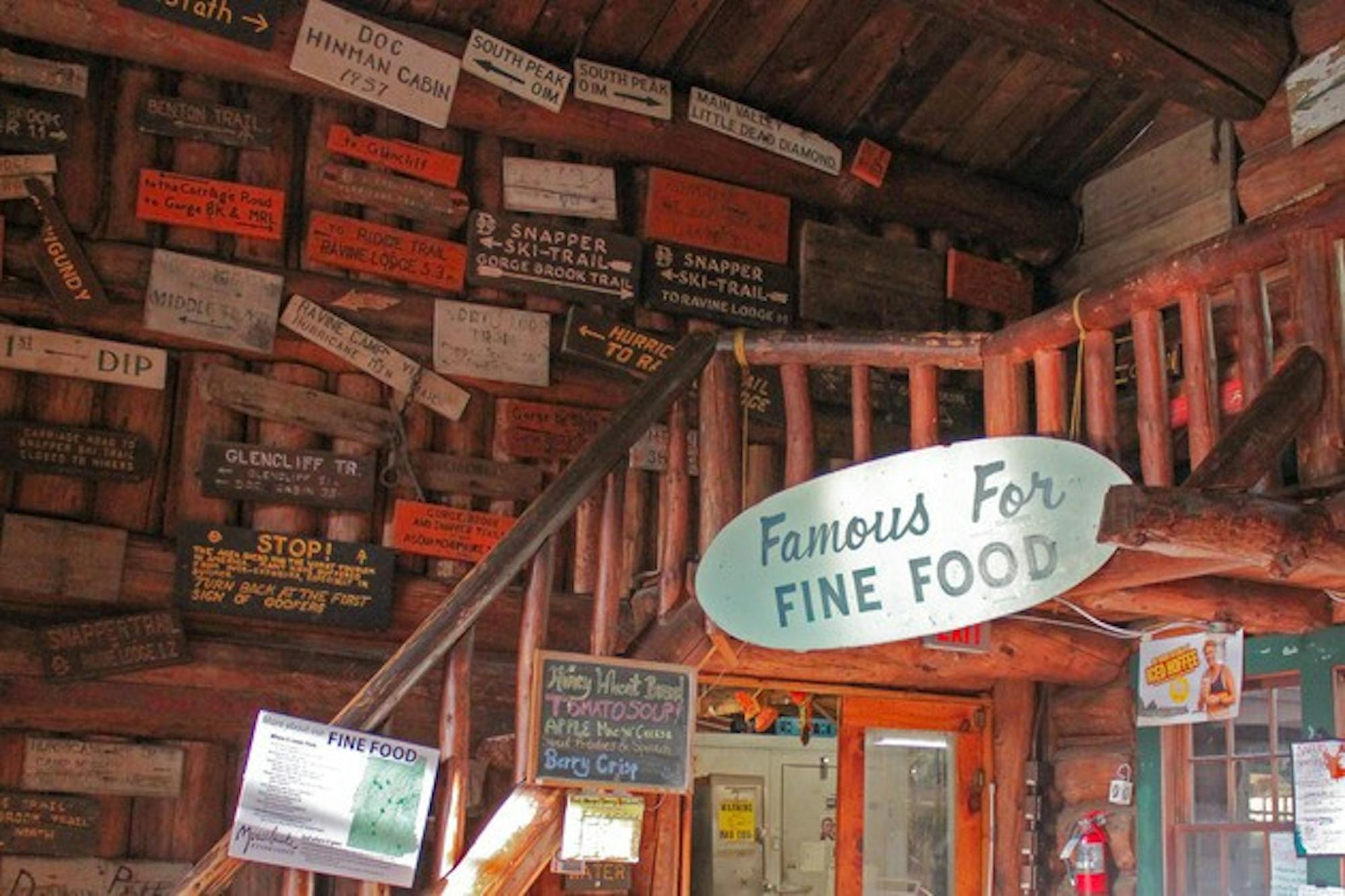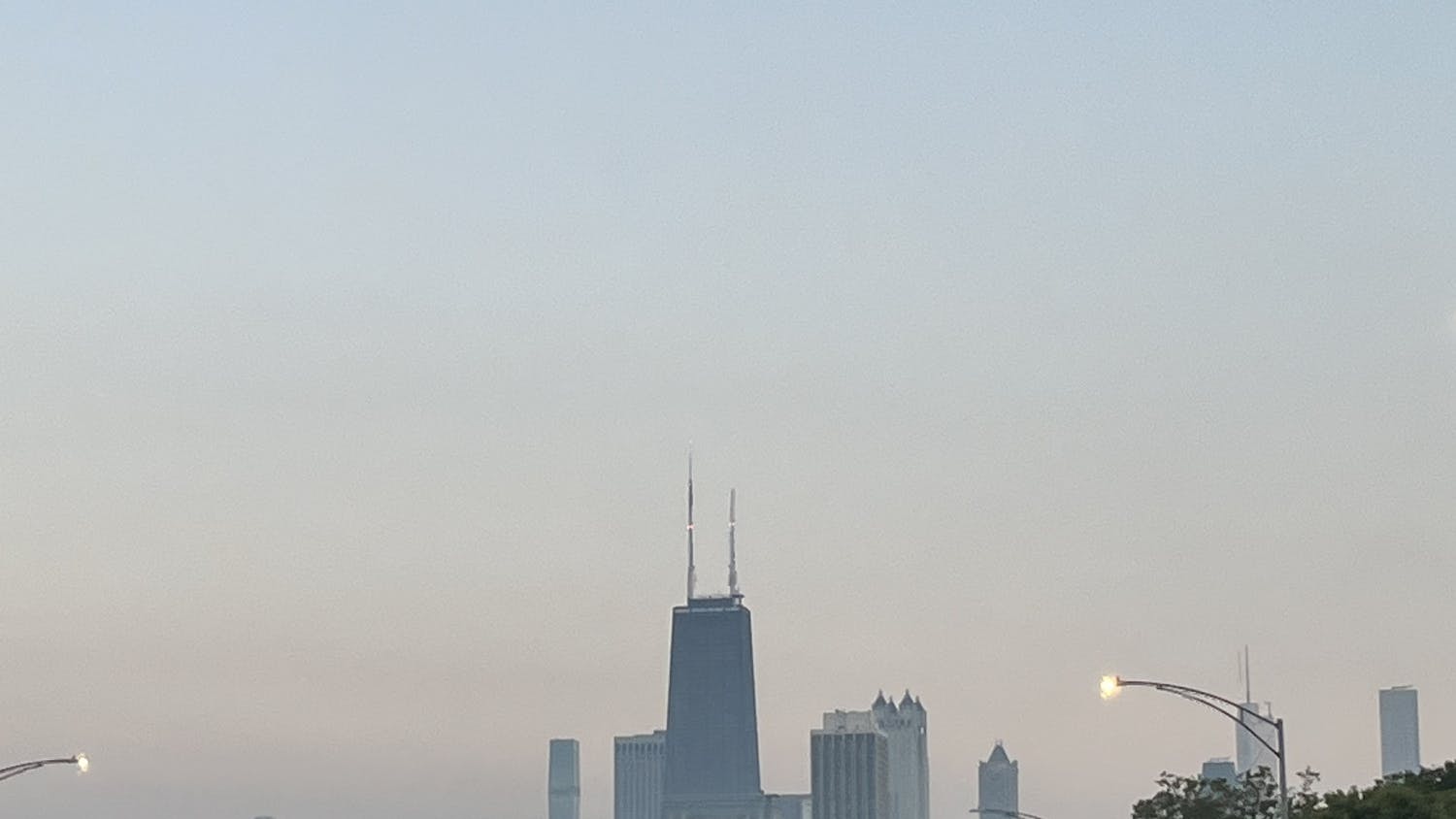An hour of New Hampshire's scenic highways and hidden, GPS-less back roads (almost all of which I managed to miss) brought me to the Lodge's main room, where I was greeted by four set tables and a peek into the bustling kitchen.
Given the Lodge's remote location, I expected only a handful of visitors, but, to my surprise, the dinner bell herded in around 25 students.
As we enjoyed a four-course dinner of honeyed bread, soup, salad and baked mac and cheese with apples, the Lodge crew presented "dinner talk," introducing themselves and their spirit animals.
Each of the four tables was given a whisk and a bowl of cream, starting a friendly race to see who could make whipped cream the fastest (humble brag: my table won), which we then paired with our desert of sugared berry jam.
Throughout our meal, the crew bustled in and out of the kitchen, bringing us first and second servings of food and retrieving finished dishes.
Lodge manager Pat Martha '05 later explained that each of the five undergraduate students on the crew rotates weekly through tasks such as cooking, working the desk and repair projects.
While the crew has a diverse range of skills, Carly Wynn '15 said lack of experience in a certain area is in fact a learning opportunity and a "blessing in disguise." The Lodge's simplicity fosters strong relationships, creating a support network that is central to the group's positive working attitude.
"Because it's so amazingly peaceful here, it's very easy to handle anything that comes at me, and the crew just seems to be the same way," Wynn said. "When problems arise, we handle them a lot more easily that we would in a chaotic environment."
The sense of community is a fundamental component of the Lodge's values, Martha said. Because the Lodge is a balance of discipline and peace, crew members can find greater self-understanding by looking within their coworkers and the outdoors.
"I think Moosilauke is a very peaceful place," he said. "The unimportant things fade away, and people find that the reason they came to work at the Lodge is to make deeper connections with the people here and with the place."
Although the Lodge closes in September and reopens in the spring, the sense of community is unbroken, ingrained in tradition and memories, rather than the physical building itself.
"People get attached to the building and the visual thing, but like someone here said, it's 90 percent tradition," Martha said. "The place has old memories and it needs people to resurface those memories."
In the short span of institutional memory, however, few remember the Lodge's history.
The Lodge was built in 1938 as a ski resort to replace an alumni outdoor ravine camp that burned down three years earlier. In 1933, the Dartmouth Outing Club organized the National Downhill Championship race on Carriage Road of Mount Moosilauke, spurring plans for a ski resort.
Although initially profitable, business at the Lodge quickly diminished as more advanced resorts opened in the area. By the 1950s and through the early 1970s, the Lodge was nearly deserted.
When former Lodge manager Bernie Waugh '74 began working at the Lodge in the 1970s, weeks would pass without a single visitor. The Lodge was almost exclusively used for DOC First-Year Trips.
After renovations under the direction of Al Merrill, a former ski coach and outdoor programs director, however, the Lodge's connection to the College strengthened and has grown ever since.
In recent years, the Lodge has gained popularity both within and outside the Dartmouth community. It expects around 10 to 20 visitors on weekdays, and 60 to 80 on weekends.
Sports teams and Greek organizations are also increasingly holding banquets and formals at the Lodge. Although groups unaffiliated with Dartmouth are relatively scarce, Martha said he is excited that non-Dartmouth traffic has been increasing over the years.
"People who discover the Lodge are just super stoked about it, and they come back all the time," he said. "It's really nice to reach out beyond Dartmouth, but it can be tough, because the Lodge is in some ways a secret place."
The Lodge even holds several weddings a year, although the privilege is usually reserved for former crew members.
Trips Lodj Croo co-chief Kara Hedges '14 said the Lodge's Dartmouth-centered history and character make the experience unique to those affiliated with the College.
"Dartmouth students are working at the Lodge, you hear the Doc Benton story, you go into the library and there are Dartmouth history books and paintings on the wall, and these are all signs of Dartmouth's traditions," Hedges said. "When you don't have that connection to Dartmouth, it's still a special place, but it loses that pull at the heartstrings."
Visiting the Lodge has long reminded students of their love for Dartmouth. The memories forged are part of a lifelong relationship with the Lodge, Waugh said. Traditions like the Doc Benton story, singing the alma mater and contra dancing are instilled through programs like Trips.
Although he no longer works on the crew, Waugh, a former resident fiddle-caller for square dances and an experienced teller of the Doc Benton ghost story, returns almost every year to call square dances during Trips.
"People feel welcome into that little exclusive community even if they aren't staying more than a couple of days," he said. "I think the more connected we get with technology and whatnot, the more people long for an experience that is separate from all that."
Although the Lodge's remote nature lends itself to serving as an escape from the clutter of technology and schoolwork, Hedges said it has the ambiance as a "home away from home."
"It's kind of bizarre," she said. "The Lodge is kind of this completely separate entity, but everything about it really just pulls at the roots of Dartmouth traditions."




